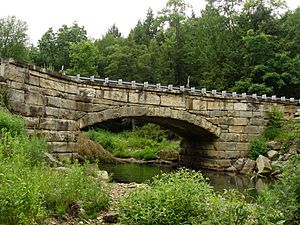Pithole Stone Arch Bridge facts for kids
Quick facts for kids Pithole Stone Arch Bridge |
|
|---|---|
 |
|
| Coordinates | 41°29′13″N 79°35′43″W / 41.48694°N 79.59528°W |
| Carries | Eagle Rock Road (SR 1004) |
| Crosses | Pithole Creek |
| Locale | Venango, Pennsylvania, United States |
| Maintained by | PennDOT |
| NBI # | 601004012000000 |
| Characteristics | |
| Total length | 11.3 m (37 ft) |
| Width | 5.2 m (17 ft) |
| Load limit | 88 short tons (80 t) |
| History | |
| Constructed by | Richard. A. Bigley |
| MPS | Highway Bridges Owned by the Commonwealth of Pennsylvania, Department of Transportation TR |
| NRHP reference No. | 88000869 |
| Added to NRHP | June 22, 1988 |
| Lua error in Module:Location_map at line 420: attempt to index field 'wikibase' (a nil value). | |
The Pithole Stone Arch Bridge is a cool old bridge that stretches 37 feet (about 11 meters) across Pithole Creek. It's located in Venango County, Pennsylvania, in the United States. This bridge is a special type called a deck arch bridge, which means the road goes over the arch. It was built a long time ago and is even listed on the National Register of Historic Places, which means it's an important historical site!
History of the Pithole Bridge
Back in 1897, people living in Cornplanter and President Townships asked Venango County to build a bridge over Pithole Creek. The county agreed to help by building the stone supports (called abutments) and the iron top part. They signed a contract in June 1898.
However, just a month later, Venango County gave a different contract to a stone builder named Richard A. Bigley. This new contract was for a "stone bridge over Pithole Creek." The bridge was officially finished on January 3, 1899.
Some people who watched the building process felt the bridge wasn't built as well as it should have been. They worried the mortar (the glue between the stones) wasn't strong enough. They also thought the arch wasn't big enough to handle floodwaters. These observers asked for $50 to be held back from Bigley's payment. But in the end, the accusations were dropped, and Bigley got paid for the bridge, minus the $50.
The bridge was owned by both townships until 1935. That's when a new law in Pennsylvania made the state take over ownership of bridges on state roads. This meant the Pennsylvania Department of Transportation (PennDOT) became the owner. In 1949, one of the wing walls (side walls that support the bridge) was replaced. The bridge was added to the National Register of Historic Places on June 22, 1988. It was also studied and recorded by the Historic American Engineering Record in 1997.
How the Bridge Was Designed
The Pithole Stone Arch Bridge is a type of arch bridge that spans 37 feet (about 11 meters) over Pithole Creek. It's pretty unique because it has a short span and a flat arch that rises only about 6 feet 7 inches (2 meters).
Another interesting thing about this bridge is its really big abutments, which are the strong supports at each end. It's also known for being very well-built, even though it's on a quiet, rural backroad. The bridge was made using a type of stone called ashlar. This means the stones were cut into neat, rectangular shapes. They were laid in "coursed" layers, which means all the stones in one layer were the same height, but each layer could have a different height. A lot of sandstone was used to build this sturdy bridge.
Images for kids
 | Shirley Ann Jackson |
 | Garett Morgan |
 | J. Ernest Wilkins Jr. |
 | Elijah McCoy |


